#bother sister love
Explore tagged Tumblr posts
Text

watching gravity falls for the first time at the request of my little sister and i just watched a tale of two stans and CRIED
#gravity falls#gravity falls fanart#mabel pines#dipper pines#dipper and mabel#grunkle stan#stan pines#i LOVE grunkle stan sm#it's a great show!#i can feel it inscribing itself on my brain lol#art#illustration#digital art#fanart#artists on tumblr#clip studio paint#csp#bill cipher#i literally was like why is this triangle guy bothering the children?? and my sister was like uhhh he's the main villain lol#NO SPOILERS PLEASE I BEG i know the show came out like 10 yrs ago but i don't know how it ends#i viscerally remember my sister walking around going the author of the journals...my BROTHER and i was like what are you TALKING about
3K notes
·
View notes
Text

Continuing with my Terzo *head*canon
Here’s some silly shenanigans featuring Copia, Primo, and a random sister!
#ghost the band#the band ghost#ghost bc#ghost#papa emeritus iii#papa terzo#papa copia#cardinal copia#copia emeritus#terzo emeritus#papa primo#primo emeritus#papa emeritus iv#papa emeritus 1#fanart#sister of sin#Terzo is just a head#he is silly#his only entertainment is bothering everyone else#i love him#my art
452 notes
·
View notes
Text
Eventually after Thalia and Leo sort of become friends they start swapping embarrassing baby Jason stories for embarrassing teen Jason stories and team up to tease him occasionally. Jason is glad two of his favorite people are getting along now but wishes they’d find a different shared interest LOL
#he loves his sister and his boyfriend to death and he’d also really love for them to stop making fun of him so much 😂😭#if it genuinely bothered him they’d stop. it doesn’t. Jason is absolutely a little disgruntled about it whenever it happens tho lol#jason grace#leo valdez#Thalia Grace#grace siblings#valgrace#heroes of olympus#hoo#leo x jason#jason x leo#Leo and Thalia
525 notes
·
View notes
Note
What do you think about Sunday and Aventurine? and their interaction in 2.1, I know Sunday did what he had to do but I just have a strong dislike for him ever since. He is an interesting character though.
I mentioned on a previous ask that I wanted to talk about narrative foils/character parallels, and that ask mentioned Aventurine being similar to Robin and a little to Sunday. But I thought I'd combine that character foils idea with this post about Sunday because...
Aventurine and Sunday are Near Perfect Character Parallels

(Also sorry to Youtuber Fayato who I screencapped this image from; I literally couldn't find a single other good image of Aventurine and Sunday in the same frame!)
In media, the concept of the narrative foil refers to a character who contrasts another character; by setting the two characters and their plots side by side, the audience is better able to understand the traits of the central character.
And by setting two surprisingly similar characters in opposition to each other, it becomes very clear how even those facing similar circumstances can take diametrically opposed paths in life.
First, let's start with the basics:
Aventurine and Sunday are both characters whose real fathers were never in the picture, and who lost their mothers right in front of their eyes to traumatizing events.

They both experienced the violent deaths ("death" in Sunday's case) of their sisters.
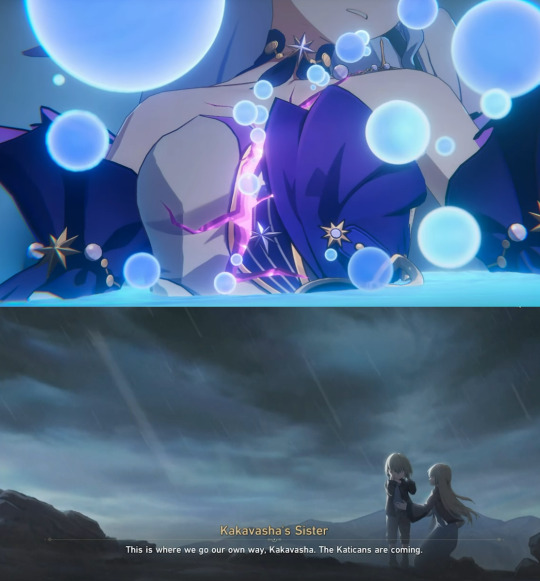
They both were "rescued" by people who intended to use them by growing them ("grooming them" in Sunday's case) into a figure of authority.

They were both told they were "chosen ones" growing up. And yet ultimately this status as the chosen one is in doubt: Aventurine isn't sure if his family's faith is real, while Gopher Wood tells Sunday that Penacony's chosen should have been Robin all along.
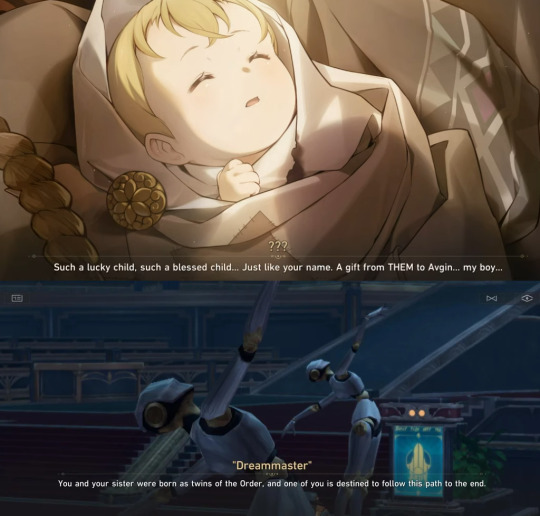
They both became self-sacrificial, Aventurine through his obvious willingness to throw his life away, and Sunday through his plan to remain outside the sweet dream to be its keeper while everyone else got to live in "paradise."

They both are trapped by their situations, Sunday by his inability to leave the cage, Aventurine by his inability to accept the life he isn't able to throw away.

They both became the "villain" of their respective patches and both faced "death."

Personality-wise, they both strongly favor being in control, to the point that their scene together is an aggressive power struggle over each other.

This is how the "future" Aventurine describes himself:

Does it sound familiar? It should, since that's exactly how people describe Sunday.
But they also both prioritize their families, and they are equally altruistic at the core while seemingly self-centered on the exterior.
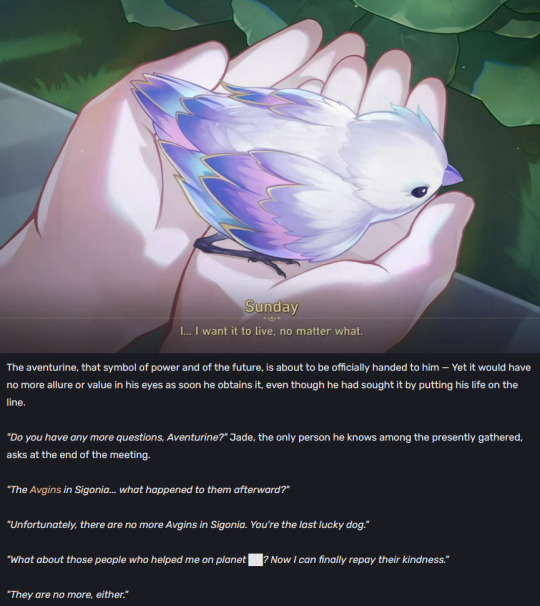
They both, of course, have the blessing of an aeon.

And here's where I'm going to take a massive tangent, but it's important: I do tend to be among those who think there is at least some connection between Ena, the Order, and Gaiathra.
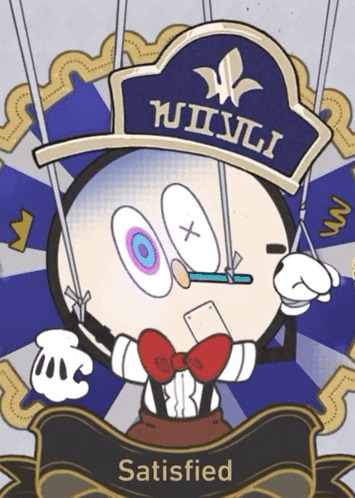
I've heard all sorts of reasons that they can't be two different concepts for the same being, from the whole "Gaiathra is a goddess of trickery and that's not related to order" to the whole "the Order's followers worship with song while Gaiathra's followers specifically don't," but I think something that has been missing from the discussion of Ena and Gaiathra's possible connection is that "Order" as a concept has entirely different definitions depending on which cultural context you approach it from.
The most mainstream modern concept of "Order" is something that is imposed: A power from on high descends to quell the chaos of the mortal world, to "bring order" through guidance to humanity. This is very Abrahamic, very modern Christian, and that is reflected in the imagery surrounding Sunday. Sunday, as a manifestation of the Order's power, believes he will be able to uplift Penacony from the mire, free people from their unfulfilled desires and confusion, and bring about perpetual peace by enforcing his understanding of harmony on the populace trapped in the dream.

Sunday's Order is not the natural state of the world but something that must be carefully cultivated and maintained, a constant battle against the chaotic forces of life and its temptations. This type of "Order" promises an idyllic future, but at the cost of the present freedom of everyone who submits to the law, who must surrender their original fate for a structured sweet dream.
We understand this concept of "Order" because at its core, it's the one that modern societies largely embrace--ruling authorities establish laws that must be followed at all costs, even when they risk the freedoms of individuals, because they ultimately (supposedly) support a greater good. A majority of society adheres to the laws handed down from on-high, and life functions relatively stably.
Yet this conception of "Order" is predicated on the idea that the course of people's lives is decided first and foremost by the people themselves--which is why they can make mistakes, go astray, and need to be shepherded in the first place.
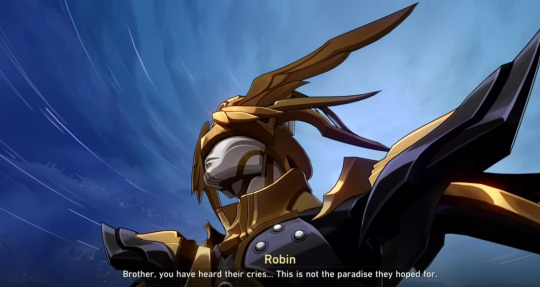
Without imposing structure through authoritarian power, this type of "Order" will crumble away in an instant, because this view assumes that rightness can only created by humanity, and that chaos--not order--is the natural state of existence.
Ena, who holds worlds tidily contained in her hands, who is tangled in puppet strings, who wears a hood like a nun or the Virgin Mary, and who is haloed like a Christian angel, clearly represents this definition of "Order" to a T.
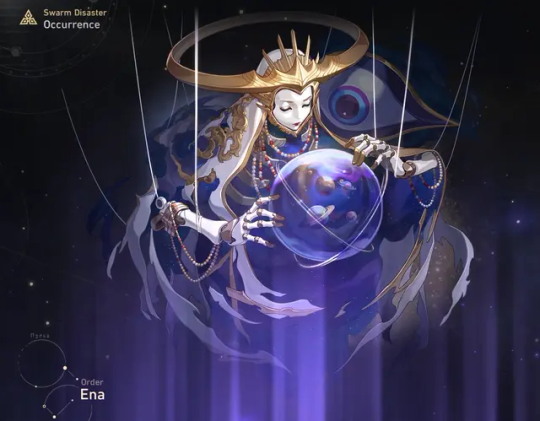
But... this is not how humanity has always defined "Order."
It was not always taken for granted that people had the power of self-determination, and in fact, for many centuries and across many cultures, the concept of "the order of the world" was tied directly to the concept of destiny. Whether a volcano would explode and destroy your entire civilization, whether floods would swallow your city, whether the crops would grow or fail all depended on the pre-made decisions of supernatural powers, who were in turn often personified concepts of the natural world itself. What happened to any given individual, what twists and turns their life would take, whether they would achieve their dreams or not--all these aspects were also predetermined, decided not by the actions of the individual but by fate itself.
Thus, the world and everything in it has a natural order. Things may seem chaotic, they may even seem unbelievably horrible, but all events in existence unfold as they should. We may not understand why, but everything occurs in due course, woven into an endlessly repeating pattern on the fates' loom--spring becomes summer, life becomes death, disasters happen and are healed from, children are born and grow old. If it is your fate to die, you will. If it is your fate to fight and live, you will. To reject this natural order would be as futile as telling the sun not to rise.
The words "order" and "ordained" have the same origin.
Enter Gaiathra. First of all, she is the Star Rail equivalent of a pagan goddess--her worship exists separate of the confirmed existence of aeons, by an uncontacted and non-space-faring race. Even her description, being triple-eyed, evokes other "triple goddess" figures across history, both in modern interpretations (the triple goddess of Neopaganism) and in ancient mythologies (the three fates of Greece, the Tridevi of Hindu culture, etc.).

She is strongly associated with the natural world: The planet of Sigonia is said to be a manifestation of her very body, the rain is her blessing and acknowledgment, and she goes through a yearly cycle of death and rebirth (calling the cycle of the seasons to mind). She is said to be a goddess of both fertility and travel (likely in the sense of nomadic wandering by the time Aventurine was born). Avgin worship of the goddess manifests in the form of sacrificial cyclic knots.
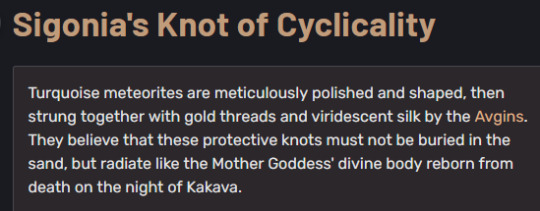
Which might call to mind another pagan culture well-known for their cyclic knots: the Celts, whose famous Celtic knots represent cycles of eternity, unity, and the interconnected nature of life itself.
The Avgin prayer to Gaiathra focuses on elements of a person's life that all might be determined by "fate"--will your blood keep flowing, will your journey be peaceful, will your schemes stay hidden? It hopes that things will be as they should, that the future ahead of you is predetermined to be a good one, and that the cycle of life decided by the goddess will be in one's favor.
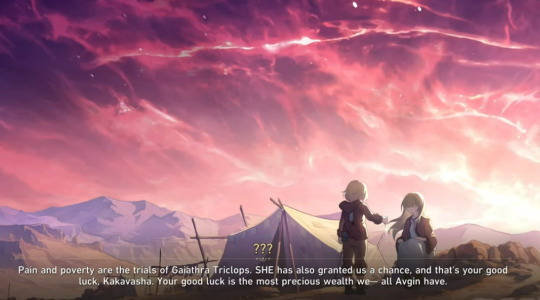
But while the Avgin hope for good things, they also strongly espouse embracing the reality of one's life, with suffering and hardships seen as manifestations of fate that should be accepted as facts of life. It is said that any society blessed by the Order ultimately falls--is it not the natural fate of all societies to one day fall? For mankind to return to the dust and be reborn anew?
Whatever will be, will be.
There is a reason--a logic--an order--to everything that happens.
I hope you can see where I'm going with this: While Sunday and Ena represent the concept of "Order" as a result of self-determination, a power "the strong" can wield to overcome the inherent chaos of reality, Aventurine and Gaiathra represent a different, older concept of "Order" (I can't help but see the entirely separate eye lurking behind Ena?): existence is not inherently chaotic but instead is foreordained, following endless orderly cycles life and death, weal and woe, rise and fall.
PHEW! Okay, so all of that to say Aventurine and Sunday make perfect parallels through a mirror darkly, even when it comes to the blessings they've been granted: One imposes order from on high; one continually rolls the dice despite knowing the inevitable outcome.
Both of their stories are entirely intertwined with the concept of fate, whether by opposing it...
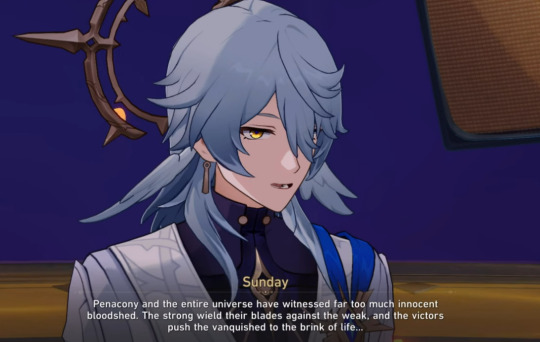
Or accepting it.

And even at the end of Penacony, we leave both Sunday and Aventurine in precarious positions. Aventurine, while ostensibly "victorious," faces another roll of the dice immediately after Penacony, when his future as a Stoneheart is called into question. Yet "fate" comes through for him again--his bet, as always, comes true. His future isn't in question--it is the question itself. What's next? He finally wants to live to find out.
Sunday, meanwhile, ends Penacony's arc in a truly difficult place. He's virtually exiled from the only home he's ever known, a flightless bird tossed out of his cage into cold hard reality. He has to find an entirely new way forward and may even be forced to reckon with an entirely new definition of "Order" itself.
The parallels between these two characters are entirely intentional and very, very blatant, and I am exceedingly interested in seeing whether their paths diverge or continue to reflect similar fates moving forward.
So uhhh... that's what I think of Sunday? 😂
#honkai star rail#aventurine#sunday hsr#gaiathra#ena the order#character analysis#hsr meta#listen#these two characters have so many parallels and obvious comparisons#like I didn't even bother to get into the bird imagery#Sunday is the Aventurine who didn't lose his sister#and didn't have to deal with the thought of being an entirely failed chosen one#until recently#AND NOW HE IS#because they're pretty much the same character into two different shades lol#which I do think is interesting#because people love and empathize with Aventurine so easily#while way more people struggle with seeing Sunday as a victim
188 notes
·
View notes
Text
Regardless if Eris marries Nesta out of ambition or love, one thing remains the same: He doesn't push her to have sex with him or get pregnant. He's not a saint, but he's decent enough to prefer when a woman actually WANTS him before sleeping with her.
Nesta was raised to see children as another duty to fulfill once she married, and after Nyx's birth, she has some heavy feelings about pregnancy, and she tells Eris that much. He respects it and agrees to wait until she's ready, until she genuinely wants to be a mother. When they sleep together, they both take precautions and make sure to not take risks.
Eris has no problem arguing with Beron if the man tries to pressure Nesta into giving them an heir, making it one of the few times he actually fights his father back. And that's the first time Nesta imagines herself having kids with him because seeing him standing up like that for her sake made her feel things
If they get married out of love, this process is even smoother because they just enjoy their time together by going into a long romantic honeymoon, away from everything. Eris has brothers after him, so it's not like he needs to conceive a child urgently, and Nesta always wanted to see the world first. It's only years after their marriage that they finally take that step, because Nesta begins to imagine her own family with Eris really often and the man is downright having a baby fever because of Elucien's kids.
The moment they start trying, they barely take breaks from it. They take this matter very seriously. Nesta falls pregnant within the month and gives birth to twin daughters.
#i headcanon eris as a girl dad#and nesta loves girls too#so they're the happies with it#beron not so much but no one in court cares about his opinion at this point#in my head he's already dead or put into a coma so he doesn't bother them#nesta choses tamlin as the godfather as a way to establish the alliance between both courts but also because she trusts him#in this au tamlin and nesta are besties btw#and elucien are also happily married and with their own little family#elain is chosen as the godmother#their kids grow up together and thrive#and tamlin's kid is part of the group too#i have this au fully developed in my head#neris#nemlin#elucien#eris vanserra#nesta archeron#lucien vanserra#elain archeron#tamlin#beron vanserra#two sisters for two brothers#indeed#acotar au#pro nesta archeron#pro tamlin
167 notes
·
View notes
Text
If an Arya stan made the headcanon/speculation of Arya ending up Queen in the North and Sansa becoming her seamstress, everyone and their mothers would cry " Biased Arya-stans!!Why do you hate Sansa so much??".
And I would agree that it would be unfair to make Sansa's endgame all about using her skills to serve her sister.
But when Sansa stans make headcanons about Queen in the North Sansa and her sworn sword Arya all those self proclaimed "loving both Stark sisters" and the " neutral" fans go:

#a post of salt and salt#arya stark#sansa stark#house stark#valyrianscrolls#personally I'm a KitN Bran truther so I don't bother much with QitN Sansa or QitN Arya headcanons#but the hypocrisy of this fandom is astonishing#they always find ways to undermine Arya and make it all about serving her sister and then they say “ we love both sisters”#loving both sisters my ass#sorry I needed to vent lol
81 notes
·
View notes
Text
Season 4 hope/prediction: Deb's show is solid, zero issues, runs flawlessly with great ratings, but her personal life is completely eroding. We start with her discovering Marcus is leaving, and it culminates in DJ going into labor right before a taping. Deb chooses the show. When it's over, and she finally flies to Vegas, it's too late -- Aiden's not letting her in because he loves his wife too much to let DJ get into a shouting match with her mom right after giving birth, and instead takes the brunt of Deb's wrath, with her making excuses and talking about how they used her money for IVF, and anyway, DJ's fine, so who cares if she wasn't there? Kathy's in the room with DJ and the baby (DJ's the closest she has to a daughter, after all) and Deb leaves too furious to think about how badly she's hurt her family.
She heads back to her Vegas mansion -- empty, obviously, Josefina and the dogs would be in LA -- and pops open a bottle of wine. Alone. Completely alone. Can't call Marty, she has no friends, the closest she's got would be Kiki and wouldn't that be embarrassing, calling your poker dealer to talk about your feelings --
and then Ava's there. She got the news about DJ's labor, she got the story from Aiden (who was distraught, by the way, man's too much of a sweetheart for Vance drama), a spare key from Damian (happy to pawn that off on her, though if it isn't returned promptly he's taking legal action) and has arrived just in time to see the Deborah Vance having a breakdown the likes of which no one thought physically possible. Crying gives you wrinkles, you know. But Ava has to be here. She's the physical embodiment of a lesson Deb never truly learned: you don't have to like someone to love them.
In my imaginary fantasy land that I am concocting this would then subsequently lead into them fucking nasty but I understand that this may be a step too far for the surprisingly large number of very normal people who watch this show and would forgive JPL for not taking it that far. However I do believe they should fuck about it and let Ava take the reigns in their relationship while they see how many of Deb's bridges they can un-burn.
#hacks hbo#ava x deborah#avorah#avadeb#hey if anyone wants to bother writing this for real go for it I don't care#if any of this is any degree of accurate for JPL's vision of s4 then I will be extremely happy#deb is NOT miranda priestly#miranda knew from the start that she could never have human connection or she'd lose her dream job#deb has inspired such genuine devotion that she does not understand that a woman in a man's role historically requires sacrifice#she knew the fire cost her the show but she didn't KNOW that that was the only reason until now#that the network did not give a shit at all#the advertisers did and the advertisers are the true enemy#she still believes she got to the top through hard work and talent#wrong the deborah vance brand was built by people who love her and believe in her#only when she has lost DJ will she be open to hearing the truth (that it was a group effort)#from the mouth of the one person who stood by her out of a wombo combo of love and spite#only THEN will she accept that kathy was right#THIS is why frank left her. THIS behavior. the belief that SHE is a special queen who did it all alone#frank was scum by the way dude groomed her little sister#his behavior is fucked but his reason is close enough to correct that ava can use it as an example of how much deb HAS to change#btw please please please we need deb sleeping with ava and not calling it a mistake because she's too fucking tired and sad
177 notes
·
View notes
Text
Dick genuinely doesn’t have a favorite sibling, he’s like the parent that says “I love all my children equally” and you believe it, he actually loves them all equally. He’s been trying to convince them that for the last few years, they don’t believe him, so he does what he has to, he says it’s Steph and let’s her deal with it.
#someone tries to say ‘she isn’t even really ur sister’ and Steph chews them out#‘oh so u think just cuz we’re not blood related we can’t be siblings’#‘oh so you’re calling me unimportant’ ‘oh so yourself saying all I am is a nuisance that hangs around you even though you don’t want me to’#‘oh are you saying I’m a leech that’s sucking off of this family’s happiness and love’#no one ever tries that again after that#so now whenever anyone brings it up all she has to say is ‘why wouldn’t I be his favorite? I’m funny#I’m pretty and I’m the best one here’ and no one can argue with that#so they just don’t#and Steph know she ain’t actually the fave she just lives for the drama#and dck is never bothered about it again#dc comics#comics#robin#batfam#dick grayson#bruce wayne#jason todd#damian wayne#tim drake#duke thomas#cassandra cain#stephanie brown
248 notes
·
View notes
Text

elain archeron
#archeron weddings part 3!#loved this silly little series and hope you all did too <3#if you’ve seen my old old art you may recognize elements of this dress from a previous fandoms art I did 🤫🤭#shhhhh#art#artist#mack’s art#drawing#procreate#women artists#elain archeron fanart#elain fanart#pro elain#elain archeron#elain acotar#acotar art#acotar fanart#the archeron sisters#yes I know the shadow is wrong but I couldn’t be bothered to fix it lmfao
75 notes
·
View notes
Text



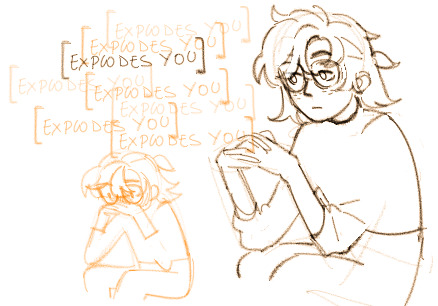
wow ive been kind of off lately I should take a day to rest an[explosion]
#[.art]#self#complaining tag#I'm good. I needed to draw about it but I'm good. it's fine. whatever#love it when I barely ask you for money to Live outside of gifts and 30 a month. and then you withold the gift SOMEONE ELSE GAVE ME#that's fine it's totally not as if I told you I need that money before. and you decided I was a bit too mean#about you compiling a document I Need To in order to keep the room and board in the place I am living in. by the way#she proceeded to change topic completely to the weather and forget about anything ive told her on the clothes I have here#or about the courses I follow. she takes notes for my sister's classes but cannot be bothered to remember i dont have exams in april#that's fineeee it's fine. it's fine. I know my sistser needs the help and I don't. I would rather die than ask for her help anyways#you can at least pretend to forget about both of us equally instead of telling me I should graduate in two years because im smart enough#which I am not. by the way. At least when I will fail at something I'll have the opportunity to tell her I told you so thank god#dont get me wrong i know her giving me compliments is a good thing I just sort of wish the were things actually about me#and not about the idea she has about me being some kind of prodigy that's simply too lazy to actually be exceptional. anyways
59 notes
·
View notes
Text




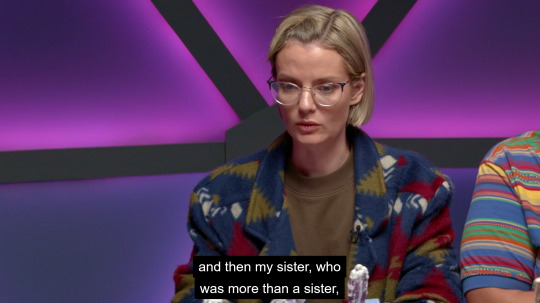
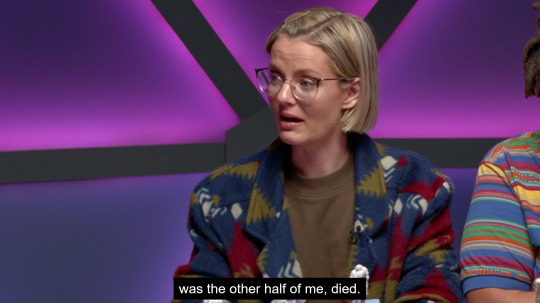
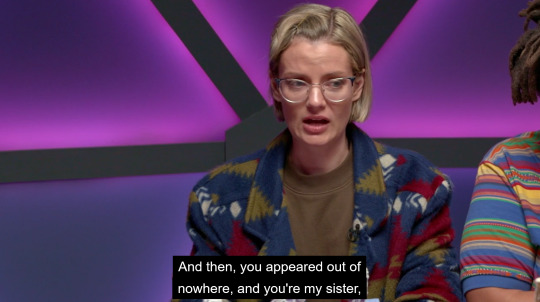
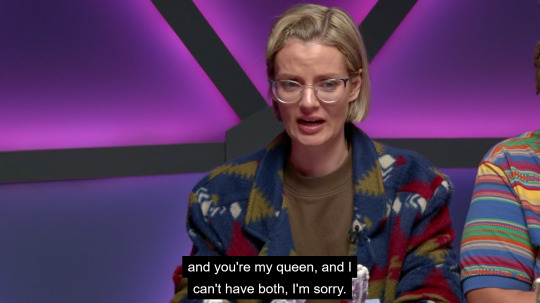
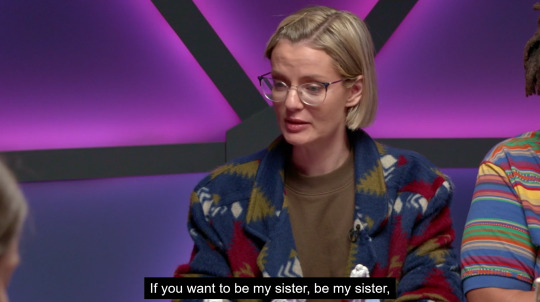
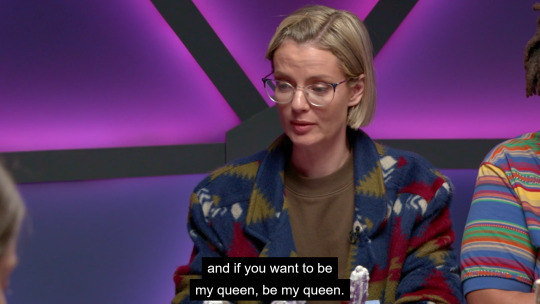
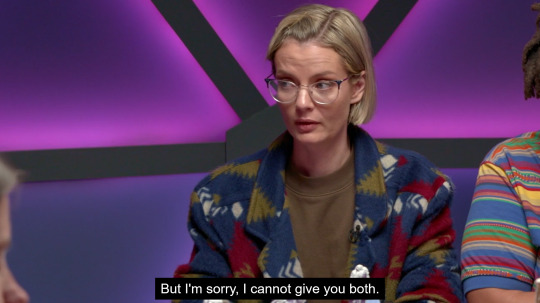

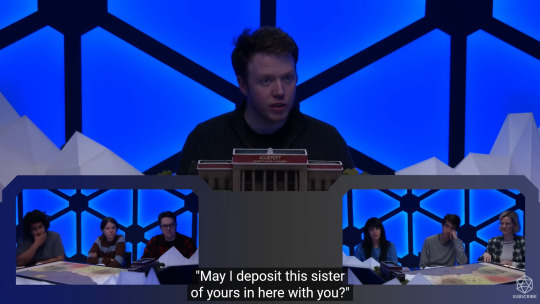
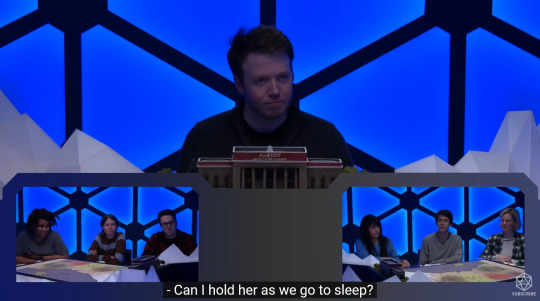
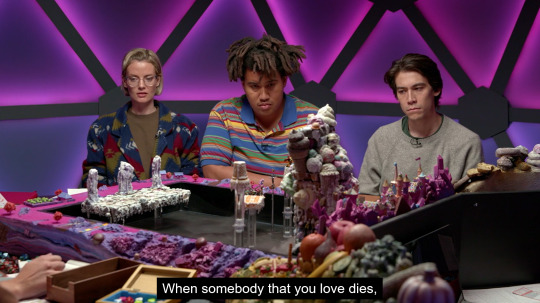
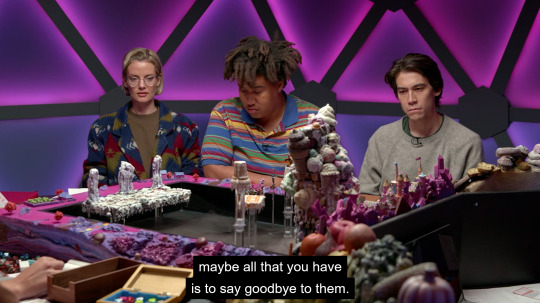
tragic actual play siblings…
#d20#fantasy high#a crown of candy#acoc#taz#taz balance#abernant sisters#rocks sisters#taaco twins#d20 spoilers#mine#dont be weird on this post. please. -_-#looking back at acoc for these screenshots... lets just say theres a pair of codependent twins here and it aint taako and lup#but like more on ruby’s side tbh bc jet does have an identity outside of her but ruby kinda doesnt#theres a post abt how jet was the most impactful death possible bc if itd been ruby it wouldve solidified jets arc#but when ruby’s the survivor she’s just left lost and unmoored bc jet really was part of her#ruby & saccharina are especially tragic to me bc if jet hadnt died ruby wouldve loved her!! she couldve had a sister!! 2 sisters!!#but jet dying was necessary for her to enter the story at all bc of the nature of the medium... she was always doomed to be an outsider#the ‘you are my heart’ line is so good so sweet i love it so much#but what lup says immediately afterward… knowing whats coming in the very next ep… one of biggest dramatic irony moments in the show for me#& it will always bother me that taako is green on the taz transcripts HE’S BLUEEE (<- his vibe NOT his skin)
62 notes
·
View notes
Note
When Tanjiro found out sanemi had a child he made a comment along the lines of “what type of woman likes a man like that” but when he found out it was shinobu’s sister he instantly regretted his comment

what the fuck i’ve been thinking abt sanekana all day HWO DID YOU KNOW hmmghghghdv guys kanae’s dead js bc i can
Tanjiro looked like a child found guilty of taking the cookies when Shinobu popped up almost on cue, holding a small child in her arms. Sanemi instantly smiled at her, taking the baby and turning to Tanjiro with a malicious glint in his eye.
“Hi, little one,” Sanemi murmured to the little bundle in his arms, offering his hand which was instantly pulled down by little tiny ones. “We were just talking about you.”
“Oh, Kamado-san?” Shinobu said, glancing at him.
“…Hello, Kocho-san,” Tanjiro mumbled, casting his eyes down.
“Hello. What were you two talking about?” Shinobu asked curiously, swatting away Sanemi’s hand as the baby attempted to eat his fingers.
“Coincidentally, we were talking about you. Or, well, Kanae,” Sanemi hummed. He moved from Shinobu’s reach, letting the child continue to create a mess of his hand.
“Ah, yes,” Tanjiro agreed quickly. “But I should be going now…”
“No, no, stay,” Sanemi insisted. “You wanted to know about my daughter, right? And her mother?”
Tanjiro bit his lip, nodding slowly. “Uhm. Yes.”
Shinobu smiled gently. “My older sister was the mother.” She gave Sanemi a brief, but furious glare, before turning back to Tanjiro. “Why did you ask?”
“He was questioning Kanae’s… ah, taste,” Sanemi said, rolling his eyes. He booped his daughter’s nose and she smiled widely. “I don’t think he believed she did this willingly.”
Shinobu frowned. As much as she had… disliked Kanae and Sanemi’s relationship, he could count on her on being on his side. After all, she trusted Kanae’s decisions and eventually had grown to trust Sanemi as well.
“Kanae knew what she was doing, I believe,” Shinobu said to Tanjiro, who was turning very red at the moment. “Shinazugawa-san was very kind to her. He can be, when he wants to.”
Tanjiro spluttered. “Yes, I apologize, I’m sorry,” he stuttered. “I didn’t mean that… I didn’t know it was her, before…”
Shinobu hummed. “If it had been without mutual agreement, Shinazugawa would not be standing here right now.”
Sanemi sighed. “No, I wouldn’t,” he agreed.
“Yes, I’m sorry-“ Tanjiro mumbled. He bowed deeply, chanting out apologies until Shinobu waved him off. When he left, she turned to Sanemi, giving him an irritated look.
“You did that on purpose, didn’t you?”
Sanemi shrugged. “He started it.”
“You idiot.”

#sanemi’s so soft here but my sister’s rushing me so im sorry#kimetsu no yaiba#asks#asked and answered#fluff#hashira#demon slayer#sanemi shinazugawa#kny#silly#ds#sanemi x kanae#kanae x sanemi#sanekana#i just love them so fucking much i cannot#featuring ✨#tanjiro kamado#shinobu kocho#and the little unnamed child#who i just called variations of ‘baby’ nd ‘child’ bc why not#i cant bother naming it im sorry#sighs#ily for asking sanekana tho#anon ask !
48 notes
·
View notes
Text
listen i love les but i just know he's the biggest cockblocker ever. like david trying to get kissy with jack and then les interrupts them with "JACK LOOK AT THIS COOL ROCK I FOUND!!" and david just groans and jack sighs but obliges anyway
#i know this because i was the younger sibling always bothering my older sister when her boyfriend was over because i thought he was so cool#i mean i still think he's cool i love him to bits i just know better than to bother them#newsies#newsies 1992#92sies#jack kelly#david jacobs#newsies jack kelly#newsies david jacobs#javid
149 notes
·
View notes
Text
now i haven't finished the dream thieves yet (i'm like,,, 7 chapters away from finishing) and i think this may contain spoilers???? but i'm not too sure yet. i'm basically gonna word vomit. i'm sorry for not using any quotes, i wish i could but i only have the ebook version and a very limited storage space on my phone where i can only have ~two books downloaded
like a normal person, i enjoy listening to video essays, see what creators want to explain to their audience and leave with a certain view, try to come to my own arguments about certain points in the videos, see if i can apply some points to other aspects of my life etc etc. (this was the type of shi that helped me with my eng lit essays rip i miss alevels) and like a normal british citizen i looked up stuff about classism in the uk. in the end, i found a video essay about classism in general and how the ultra rich try to mimic being poor to get away from their hard issues that comes with being rich (which, frankly, is probably a lot less compared to someone who is working class).
recently, i was talking to my friend about specifics in the book about certain characters and i remember we went onto the convo of making music playlists for the characters. they said "it's gonna be hard for adam [...] cuz his whole thing is about being unknowable" and it always struck me with how unknowable he truly is when reading his character because his character is intrinsically linked to his working class background. (context: i'm a middle class child of immigrants who built themselves in the uk)
it's very clear the kind of social commentary stiefvater wanted to make using adam's character with how isolating and alienating it can be coming from a working class background trying to assimilate yourself into a society of those protected and privileged enough to not have any problems with accessing opportunities. how class is a huge obstacle between interpersonal relationships and feeling safe enough to be vulnerable with your issues with being working class. how difference in class can cause one-sided shame because of the meritocratic society we're living in. how, no matter how much money you earn or how many connections you can make, your attachment to your working class identity can be enough reason to aim for something supernaturally larger than yourself.
it's evident that other characters overlook adam's social class because he's a "self-made man" (or smth) and mainly because he's their friend: adam. however, when we get a chapter in his pov, class is a driving factor in how he interacts and views everyone. we can see the privilege gansey and ronan have for being able to not even consider class as an intimidating aspect about themselves to a normal person, but it's everything to adam in the sense that he feels like his earned money doesn't give him access to a similar respect.
now that i truly think about it, it was a good idea for adam not to join them in monmouth manufacturing because it just feels like they're... mocking him in an indirect way? they have the ability to choose to live in a nice place and instead chose to live in a random, run-down building because it seemed aesthetic. adam was forced to live in a rundown trailer because that's all they could have afforded. i know gansey had good intentions for wanting adam to join them, but everything that he likes as an aesthetic (monmouth manufacturing, the run-down camaro, eating mint leaves instead of gum) can seem like he's flaunting the fact he can choose that lifestyle without any consequences.
back to the point of the meritocratic society (which we usually assume in books that take place in a similar world as our own) creating shame because of their class: the assumption that because someone has worked hard to earn what they have gives them a right to be proud. but this is the opposite for adam as he fights with the fact that he could have maybe be seen as even more equal to gansey if he had just been born with wealth.
we can frame it as, maybe, despite gansey's desire to appear working class, it only broadens the distance between him and adam. it only worsens adam's difficult relationship with his class shame despite probably wanting to be more relatable or even laid-back.
when reading the second book after his sacrifice, i was confused as to why adam was so un-adam-like. i mean, in the first book i didn't really understand him because of his huge insistance that his class makes him inherently inferior to everyone he surrounds himself with and i don't see class as an issue myself.
however, his sacrifice basically was watering the seed of ambition that was planted when he decided to aim for aglionby. it becamse clearer to me how much this opportunity to be superior, even if it's supernatural and terrifying, is important for him understanding in what he thinks he lacks. by those thoughts of what he lacks, he thought that this chance to be cabeswater's channel could be a way to compensate for his inferior social class. or something.
anyways, thank you for coming to my ted talk. this is not proofread, and my sister keeps nagging at me to shower. also i simp for gansey do not think this is me trying mischaracterising him i'm just trying to understand the theme of class in this series and having gansey as a figure to compare to is literally integral.
#the raven cycle#the raven boys#maggie stiefvater#adam parrish#richard campbell gansey iii#ronan lynch#social classes#my sister looked at my screen and went 'what the freak why are u writing a reddit post'#i told her i was on tumblr n she said it was the length of a reddit post#i am in love with gansey#i am also in love with adam#and his unknowable-ness#i need to get this off my chest because i cannot keep bothering my friend with my stupid theories and analysis#i also don't share it cuz ik they already know it#help i need to finish reading it instead of analysing this
22 notes
·
View notes
Text
Tell Your Dad You Love Him
A retelling of "Meat Loves Salt"/"Cap O'Rushes" for the @inklings-challenge Four Loves event
An old king had three daughters. When his health began to fail, he summoned them, and they came.
Gordonia and Rowan were already waiting in the hallway when Coriander arrived. They were leaned up against the wall opposite the king’s office with an air of affected casualness. “I wonder what the old war horse wants today?” Rowan was saying. “More about next year’s political appointments, I shouldn’t wonder.”
“The older he gets, the more he micromanages,” Gordonia groused fondly. “A thousand dollars says this meeting could’ve been an email.”
They filed in single-file like they’d so often done as children: Gordonia first, then Rowan, and Coriander last of all. The king had placed three chairs in front of his desk all in a row. His daughters murmured their greetings, and one by one they sat down.
“I have divided everything I have in three,” the king said. “I am old now, and it’s time. Today, I will pass my kingdom on to you, my daughters.”
A short gasp came from Gordonia. None of them could have imagined that their father would give up running his kingdom while he still lived.
The king went on. “I know you will deal wisely with that which I leave in your care. But before we begin, I have one request.”
“Yes father?” said Rowan.
“Tell me how much you love me.”
An awkward silence fell. Although there was no shortage of love between the king and his daughters, theirs was not a family which spoke of such things. They were rich and blue-blooded: a soldier and the daughters of a soldier, a king and his three court-reared princesses. The royal family had always shown their affection through double meanings and hot cups of coffee.
Gordonia recovered herself first. She leaned forward over the desk and clasped her father’s hands in her own. “Father,” she said, “I love you more than I can say.” A pause. “I don’t think there’s ever been a family so happy in love as we have been. You’re a good dad.”
The old king smiled and patted her hand. “Thank you, Gordonia. We have been very happy, haven’t we? Here is your inheritance. Cherish it, as I cherish you.”
Rowan spoke next; the words came tumbling out. “Father! There’s not a thing in my life which you didn’t give me, and all the joy in the world beside. Come now, Gordonia, there’s no need to understate the matter. I love you more than—why, more than life itself!”
The king laughed, and rose to embrace his second daughter. “How you delight me, Rowan. All of this will be yours.”
Only Coriander remained. As her sisters had spoken, she’d wrung her hands in her lap, unsure of what to say. Did her father really mean for flattery to be the price of her inheritance? That just wasn’t like him. For all that he was a politician, he’d been a soldier first. He liked it when people told the truth.
When the king’s eyes came to rest on her, Coriander raised her own to meet them. “Do you really want to hear what you already know?”
“I do.”
She searched for a metaphor that could carry the weight of her love without unnecessary adornment. At last she found one, and nodded, satisfied. “Dad, you’re like—like salt in my food.”
“Like salt?”
“Well—yes.”
The king’s broad shoulders seemed to droop. For a moment, Coriander almost took back her words. Her father was the strongest man in the world, even now, at eighty. She’d watched him argue with foreign rulers and wage wars all her life. Nothing could hurt him. Could he really be upset?
But no. Coriander held her father’s gaze. She had spoken true. What harm could be in that?
“I don’t know why you’re even here, Cor,” her father said.
Now, Coriander shifted slightly in her seat, unnerved. “What? Father—”
“It would be best if—you should go,” said the old king.
“Father, you can’t really mean–”
“Leave us, Coriander.”
So she left the king’s court that very hour.
.
It had been a long time since she’d gone anywhere without a chauffeur to drive her, but Coriander’s thoughts were flying apart too fast for her to be afraid. She didn’t know where she would go, but she would make do, and maybe someday her father would puzzle out her metaphor and call her home to him. Coriander had to hope for that, at least. The loss of her inheritance didn’t feel real yet, but her father—how could he not know that she loved him? She’d said it every day.
She’d played in the hall outside that same office as a child. She’d told him her secrets and her fears and sent him pictures on random Tuesdays when they were in different cities just because. She had watched him triumph in conference rooms and on the battlefield and she’d wanted so badly to be like him.
If her father doubted her love, then maybe he’d never noticed any of it. Maybe the love had been an unnoticed phantasm, a shadow, a song sung to a deaf man. Maybe all that love had been nothing at all.
A storm was on the horizon, and it reached her just as she made it onto the highway. Lightning flashed and thunder rolled. Rain poured down and flooded the road. Before long, Coriander was hydroplaning. Frantically, she tried to remember what you were supposed to do when that happened. Pump the brakes? She tried. No use. Wasn’t there something different you did if the car had antilock brakes? Or was that for snow? What else, what else–
With a sickening crunch, her car hit the guardrail. No matter. Coriander’s thoughts were all frenzied and distant. She climbed out of the car and just started walking.
Coriander wandered beneath an angry sky on the great white plains of her father’s kingdom. The rain beat down hard, and within seconds she was soaked to the skin. The storm buffeted her long hair around her head. It tangled together into long, matted cords that hung limp down her back. Mud soiled her fine dress and splattered onto her face and hands. There was water in her lungs and it hurt to breathe. Oh, let me die here, Coriander thought. There’s nothing left for me, nothing at all. She kept walking.
.
When she opened her eyes, Coriander found herself in a dank gray loft. She was lying on a strange feather mattress.
She remained there a while, looking up at the rafters and wondering where she could be. She thought and felt, as it seemed, through a heavy and impenetrable mist; she was aware only of hunger and weakness and a dreadful chill (though she was all wrapped in blankets). She knew that a long time must have passed since she was fully aware, though she had a confused memory of wandering beside the highway in a thunderstorm, slowly going mad because—because— oh, there’d been something terrible in her dreams. Her father, shoulders drooping at his desk, and her sisters happily come into their inheritance, and she cast into exile—
She shuddered and sat up dizzily. “Oh, mercy,” she murmured. She hadn’t been dreaming.
She stumbled out of the loft down a narrow flight of stairs and came into a strange little room with a single window and a few shabby chairs. Still clinging to the rail, she heard a ruckus from nearby and then footsteps. A plump woman came running to her from the kitchen, wiping her hands on her apron and softly clucking at the state of her guest’s matted, tangled hair.
“Dear, dear,” said the woman. “Here’s my hand, if you’re still unsteady. That’s good, good. Don’t be afraid, child. I’m Katherine, and my husband is Folke. He found you collapsed by the goose-pond night before last. I’m she who dressed you—your fine gown was ruined, I’m afraid. Would you like some breakfast? There’s coffee on the counter, and we’ll have porridge in a minute if you’re patient.”
“Thank you,” Coriander rasped.
“Will you tell me your name, my dear?”
“I have no name. There’s nothing to tell.”
Katherine clicked her tongue. “That’s alright, no need to worry. Folke and I’ve been calling you Rush on account of your poor hair. I don’t know if you’ve seen yourself, but it looks a lot like river rushes. No, don’t get up. Here’s your breakfast, dear.”
There was indeed porridge, as Katherine had promised, served with cream and berries from the garden. Coriander ate hungrily and tasted very little. Then, when she was finished, the goodwife ushered her over to a sofa by the window and put a pillow beneath her head. Coriander thanked her, and promptly fell asleep.
.
She woke again around noon, with the pounding in her head much subsided. She woke feeling herself again, to visions of her father inches away and the sound of his voice cracking across her name.
Katherine was outside in the garden; Coriander could see her through the clouded window above her. She rose and, upon finding herself still in a borrowed nightgown, wrapped herself in a blanket to venture outside.
“Feeling better?” Katherine was kneeling in a patch of lavender, but she half rose when she heard the cottage door open.
“Much. Thank you, ma’am.
“No thanks necessary. Folke and I are ministers, of a kind. We keep this cottage for lost and wandering souls. You’re free to remain here with us for as long as you need.”
“Oh,” was all Coriander could think to say.
“You’ve been through a tempest, haven’t you? Are you well enough to tell me where you came from?”
Coriander shifted uncomfortably. “I’m from nowhere,” she said. “I have nothing.”
“You don’t owe me your story, child. I should like to hear it, but it will keep till you’re ready. Now, why don’t you put on some proper clothes and come help me with this weeding.”
.
Coriander remained at the cottage with Katherine and her husband Folke for a week, then a fortnight. She slept in the loft and rose with the sun to help Folke herd the geese to the pond. After, Coriander would return and see what needed doing around the cottage. She liked helping Katherine in the garden.
The grass turned gold and the geese’s thick winter down began to come in. Coriander’s river-rush hair proved itself unsalvageable. She spent hours trying to untangle it, first with a hairbrush, then with a fine-tooth comb and a bottle of conditioner, and eventually even with honey and olive oil (a home remedy that Folke said his mother used to use). So, at last, Coriander surrendered to the inevitable and gave Katherine permission to cut it off. One night, by the yellow light of the bare bulb that hung over the kitchen table, Katherine draped a towel over Coriander’s shoulders and tufts of gold went falling to the floor all round her.
“I’m here because I failed at love,” she managed to tell the couple at last, when her sorrows began to feel more distant. “I loved my father, and he knew it not.”
Folke and Katherine still called her Rush. She didn’t correct them. Coriander was the name her parents gave her. It was the name her father had called her when she was six and racing down the stairs to meet him when he came home from Europe, and at ten when she showed him the new song she’d learned to play on the harp. She’d been Cor when she brought her first boyfriend home and Cori the first time she shadowed him at court. Coriander, Coriander, when she came home from college the first time and he’d hugged her with bruising strength. Her strong, powerful father.
As she seasoned a pot of soup for supper, she wondered if he understood yet what she’d meant when she called him salt in her food.
.
Coriander had been living with Katherine and Folke for two years, and it was a morning just like any other. She was in the kitchen brewing a pot of coffee when Folke tossed the newspaper on the table and started rummaging in the fridge for his orange juice. “Looks like the old king’s sick again,” he commented casually. Coriander froze.
She raced to the table and seized hold of the paper. There, above the fold, big black letters said, KING ADMITTED TO HOSPITAL FOR EMERGENCY TREATMENT. There was a picture of her father, looking older than she’d ever seen him. Her knees went wobbly and then suddenly the room was sideways.
Strong arms caught her and hauled her upright. “What’s wrong, Rush?”
“What if he dies,” she choked out. “What if he dies and I never got to tell him?”
She looked up into Folke’s puzzled face, and then the whole sorry story came tumbling out.
When she was through, Katherine (who had come downstairs sometime between salt and the storm) took hold of her hand and kissed it. “Bless you, dear,” she said. “I never would have guessed. Maybe it’s best that you’ve both had some time to think things over.”
Katherine shook her head. “But don’t you think…?”
“Yes?”
“Well, don’t you think he should have known that I loved him? I shouldn’t have needed to say it. He’s my father. He’s the king.”
Katherine replied briskly, as though the answer should have been obvious. “He’s only human, child, for all that he might wear a crown; he’s not omniscient. Why didn’t you tell your father what he wanted to hear?”
“I didn’t want to flatter him,” said Coriander. “That was all. I wanted to be right in what I said.”
The goodwife clucked softly. “Oh dear. Don’t you know that sometimes, it’s more important to be kind than to be right?”
.
In her leave-taking, Coriander tried to tell Katherine and Folke how grateful she was to them, but they wouldn’t let her. They bought her a bus ticket and sent her on her way towards King’s City with plenty of provisions. Two days later, Coriander stood on the back steps of one of the palace outbuildings with her little carpetbag clutched in her hands.
Stuffing down the fear of being recognized, Coriander squared her shoulders and hoped they looked as strong as her father’s. She rapped on the door, and presently a maid came and opened it. The maid glanced Coriander up and down, but after a moment it was clear that her disguise held. With all her long hair shorn off, she must have looked like any other girl come in off the street.
“I’m here about a job,” said Coriander. “My name’s Rush.”
.
The king's chambers were half-lit when Coriander brought him his supper, dressed in her servants’ apparel. He grunted when she knocked and gestured with a cane towards his bedside table. His hair was snow-white and he was sitting in bed with his work spread across a lap-desk. His motions were very slow.
Coriander wanted to cry, seeing her father like that. Yet somehow, she managed to school her face. Like he would, she kept telling herself. Stoically, she put down the supper tray, then stepped back out into the hallway.
It was several minutes more before the king was ready to eat. Coriander heard papers being shuffled, probably filed in those same manilla folders her father had always used. In the hall, Coriander felt the seconds lengthen. She steeled herself for the moment she knew was coming, when the king would call out in irritation, “Girl! What's the matter with my food? Why hasn’t it got any taste?”
When that moment came, all would be made right. Coriander would go into the room and taste his food. “Why,” she would say, with a look of complete innocence, “It seems the kitchen forgot to salt it!” She imagined how her father’s face would change when he finally understood. My daughter always loved me, he would say.
Soon, soon. It would happen soon. Any second now.
The moment never came. Instead, the floor creaked, followed by the rough sound of a cane striking the floor. The door opened, and then the king was there, his mighty shoulders shaking. “Coriander,” he whispered.
“Dad. You know me?”
“Of course.”
“Then you understand now?”
The king’s wrinkled brow knit. “Understand about the salt? Of course, I do. It wasn't such a clever riddle. There was surely no need to ruin my supper with a demonstration.”
Coriander gaped at him. She'd expected questions, explanations, maybe apologies for sending her away. She'd never imagined this.
She wanted very badly to seize her father and demand answers, but then she looked, really looked, at the way he was leaning on his cane. The king was barely upright; his white head was bent low. Her questions would hold until she'd helped her father back into his room.
“If you knew what I meant–by saying you were like salt in my food– then why did you tell me to go?” she asked once they were situated back in the royal quarters.
Idly, the king picked at his unseasoned food. “I shouldn’t have done that. Forgive me, Coriander. My anger and hurt got the better of me, and it has brought me much grief. I never expected you to stay away for so long.”
Coriander nodded slowly. Her father's words had always carried such fierce authority. She'd never thought to question if he really meant what he’d said to her.
“As for the salt,” continued the king, "Is it so wrong that an old man should want to hear his daughters say ‘I love you' before he dies?”
Coriander rolled the words around in her head, trying to make sense of them. Then, with a sudden mewling sound from her throat, she managed to say, “That's really all you wanted?”
“That's all. I am old, Cor, and we've spoken too little of love in our house.” He took another bite of his unsalted supper. His hand shook. “That was my failing, I suppose. Perhaps if I’d said it, you girls would have thought to say it back.”
“But father!” gasped Coriander, “That’s not right. We've always known we loved one another! We've shown it a thousand ways. Why, I've spent the last year cataloging them in my head, and I've still not even scratched the surface!”
The king sighed. “Perhaps you will understand when your time comes. I knew, and yet I didn't. What can you really call a thing you’ve never named? How do you know it exists? Perhaps all the love I thought I knew was only a figment.”
“But that’s what I’ve been afraid of all this time,” Coriander bit back. “How could you doubt? If it was real at all– how could you doubt?”
The king’s weathered face grew still. His eyes fell shut and he squeezed them. “Death is close to me, child. A small measure of reassurance is not so very much to ask.”
.
Coriander slept in her old rooms that night. None of it had changed. When she woke the next morning, for a moment she remembered nothing of the last two years.
She breakfasted in the garden with her father, who came down the steps in a chair-lift. “Coriander,” he murmured. “I half-thought I dreamed you last night.”
“I’m here, Dad,” she replied. “I’m not going anywhere.”
Slowly, the king reached out with one withered hand and caressed Coriander's cheek. Then, his fingers drifted up to what remained of her hair. He ruffled it, then gently tugged on a tuft the way he'd used to playfully tug her long braid when she was a girl.
“I love you,” he said.
“That was always an I love you, wasn’t it?” replied Coriander. “My hair.”
The king nodded. “Yes, I think it was.”
So Coriander reached out and gently tugged the white hairs of his beard. “You too,” she whispered.
.
“Why salt?” The king was sitting by the fire in his rooms wrapped in two blankets. Coriander was with him, enduring the sweltering heat of the room without complaint.
She frowned. “You like honesty. We have that in common. I was trying to be honest–accurate–to avoid false flattery.”
The king tugged at the outer blanket, saying nothing. His lips thinned and his eyes dropped to his lap. Coriander wished they wouldn’t. She wished they would hold to hers, steely and ready for combat as they always used to be.
“Would it really have been false?” the king said at last. “Was there no other honest way to say it? Only salt?”
Coriander wanted to deny it, to give speech to the depth and breadth of her love, but once again words failed her. “It was my fault,” she said. “I didn’t know how to heave my heart into my throat.” She still didn’t, for all she wanted to.
.
When the doctor left, the king was almost too tired to talk. His words came slowly, slurred at the edges and disconnected, like drops of water from a leaky faucet.
Still, Coriander could tell that he had something to say. She waited patiently as his lips and tongue struggled to form the words. “Love you… so… much… You… and… your sisters… Don’t… worry… if you… can’t…say…how…much. I… know.”
It was all effort. The king sat back when he was finished. Something was still spasming in his throat, and Coriander wanted to cry.
“I’m glad you know,” she said. “I’m glad. But I still want to tell you.”
Love was effort. If her father wanted words, she would give him words. True words. Kind words. She would try…
“I love you like salt in my food. You're desperately important to me, and you've always been there, and I don't know what I'll do without you. I don’t want to lose you. And I love you like the soil in a garden. Like rain in the spring. Like a hero. You have the strongest shoulders of anyone I know, and all I ever wanted was to be like you…”
A warm smile spread across the old king’s face. His eyes drifted shut.
#inklingschallenge#theme: storge#story: complete#inklings challenge#leah stories#OKAY. SO#i spend so much time thinking about king lear. i think i've said before that it's my favorite shakespeare play. it is not close#and one of the hills i will die on is that cordelia was not in the right when she refused to flatter her dad#like. obviously he's definitely not in the right either. the love test was a screwed up way to make sure his kids loved him#he shouldn't have tied their inheritances into it. he DEFINITELY shouldn't have kicked cordelia out when she refused to play#but like. Cordelia. there is no good reason not to tell your elderly dad how much you love him#and okay obviously lear is my starting point but the same applies to the meat loves salt princess#your dad wants you to tell him you love him. there is no good reason to turn it into a riddle. you had other options#and honestly it kinda bothers me when people read cordelia/the princess as though she's perfectly virtuous#she's very human and definitely beats out the cruel sisters but she's definitely not aspirational. she's not to be emulated#at the end of the day both the fairytale and the play are about failures in storge#at happens when it's there and you can't tell. when it's not and you think it is. when you think you know someone's heart and you just don'#hey! that's a thing that happens all the time between parents and children. especially loving past each other and speaking different langua#so the challenge i set myself with this story was: can i retell the fairytale in such a way that the princess is unambiguously in the wrong#and in service of that the king has to get softened so his errors don't overshadow hers#anyway. thank you for coming to my TED talk#i've been thinking about this story since the challenge was announced but i wrote the whole thing last night after the super bowl#got it in under the wire! yay!#also! the whole 'modern setting that conflicts with the fairytale language' is supposed to be in the style of modern shakespeare adaptation#no idea if it worked but i had a lot of fun with it#pontifications and creations
70 notes
·
View notes
Text
don't let it in with no intention to keep it au, p1
The first time Dawn Summers meets Spike, she's twelve years old and supposed to be in bed, technically.
There's been police at their house all day, and their mom has been worried, calling people and driving around and not letting Dawn go to her friend Kayla's house even though she promised last week that Dawn could sleep over if she got all her homework done. It's not fair. Dawn sits on the end of her bed in her PJs and chews on her nails, which is a gross habit that she had stopped doing, but she just can't help it, she's sorry.
It's because Buffy's in trouble, again, and Willow's in the hospital, and Mr. Giles is missing, and the police said a girl died, too, but they didn't say who it was. Dawn heard the police guy tell Mom that if Buffy turned herself in, everything would be alright, but that's a lie. Buffy's in trouble again, and it's big trouble this time, and Dawn's passed the point where she's smug about her big, know-it-all, annoying sister being the problem child and starting to get really scared.
No one's seen Buffy for, like, more than a day.
So when Dawn hears her sister's voice in the front yard, she goes running downstairs and throws open the door. She stumbles to a stop just inside the doorway.
And stares. Buffy is standing on the porch with their mom and a man Dawn doesn't know. Mom looks tense and drawn; so does Buffy. They both have a set to their shoulders that indicates to Dawn that they are mid-argument, only company is over so they have to be polite about it.
The man is funny. He's short, with an angular face and hair bleached almost as pale as his skin. He's all tattooed and he's got a scar in one eyebrow and a piercing in the other and he's wearing a long, leather trench kinda coat with sort of punk rock clothes - he doesn't look like one of Buffy's friends, Dawn thinks, staring at him.
He's staring back at her, an exaggerated tilt to his head, like a curious dog. His eyes look washed-out and nearly colorless in the orange porchlight, pupils too big. They're focused very intensely on her.
"And who might you be, luv?" he asks. His voice sounds funny, like someone from a movie. Dawn blinks at him.
Before she can respond, Buffy darts between them, snarling. "You don't talk to my sister," she snaps.
"Dawn," Mom says. She walks past the man and Buffy, who are now glaring at each other in the doorway, and takes Dawn's hand. "Let's get you to bed."
"But -" Dawn argues. It's not fair, she thinks, it's really not.
"I guess you're gonna have to come in, Spike," she hears Buffy say like acid.
"I guess that's invitation enough," the man - Spike? - says back.
Dawn wants to stay and see what Buffy is doing with this weird man and what it has to do with the dead girl and Willow and Mr. Giles and the police. Her mom, in her infinite wisdom, ignores her twelve-year-old protests and leads her up the stairs and back to her room. She eavesdrops on the rest of the negotiation - the discussion - the fight - crouched at the top of the banister.
And if Spike, on his way out the front door, glances up, catches her eye, and winks, well ... her mom and Buffy don't have to know.
#spike#dawn summers#joyce summers#buffy summers#it's terribly simple#myfic#witness my tattooed-and-pierced spike truther agenda. i'm pushing it until it becomes fanon.#also let's just start writing dawn into the early seasons of buffy i know people hate dawn but i adore her i truly do i think#the early seasons would have been great with a bratty little sister character to bother buffy honestly. i think so. i love dawn#also i think that dawn would be twelve and not eleven at this point ? but whatever. she doesnt exist yet technically soooooo it dont matter#ALSO also So Important to me that soulless evil didnt-know-he-was-in-love-with-buffy-yet spike took one look at bitty baby dawn and went#''yum! tasty little treat! all for me? oh buffy you shouldnt have''#don't let it in with no intention to keep it au
13 notes
·
View notes